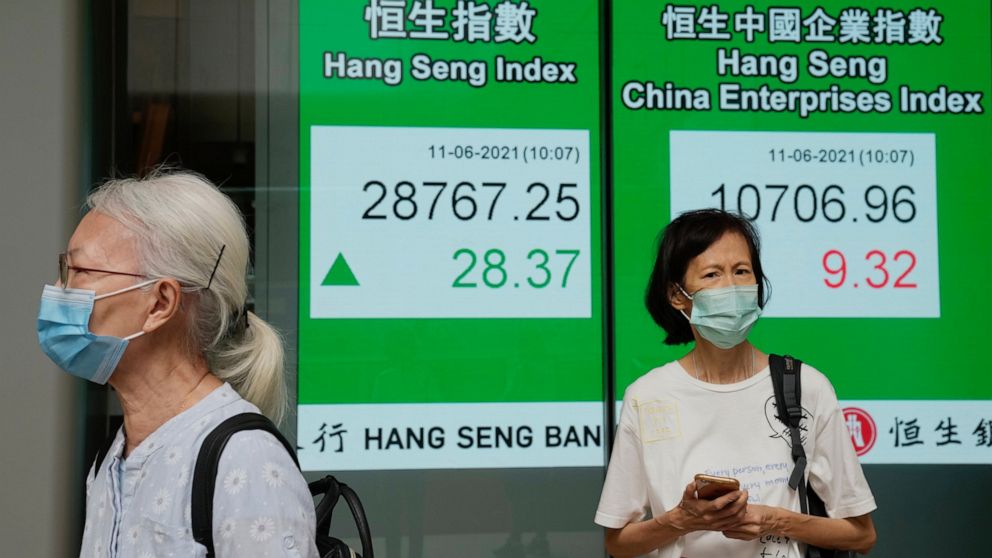Asian shares mixed after US inflation jumps 5% in May
Shares are mostly higher in Asia after the S&P 500 index notched another record high despite a surge in U.S. consumer prices in May
BANGKOK — Shares were mostly higher in Asia on Friday after the S&P 500 index notched another record high despite a surge in U.S. consumer prices in May.
Shanghai fell, Tokyo was nearly unchanged, while shares rose in Hong Kong, Seoul and Sydney. U.S. futures were marginally lower.
On Thursday, Wall Street logged gains while bond yields mostly fell despite the much-anticipated report showing consumer prices rose 5% in May, the biggest year-over-year increase since 2008 and more than economists had expected.
Investors also reacted positively to more data that showed continued improvement in the labor market.
The worry is that if signs of inflation persist, central banks may move to withdraw stimulus from the economy to ease price pressures.
But investors are still buying into the Federal Reserve’s stance that the current bout of inflation is transitory, said Jeffrey Halley of OANDA.
“Financial markets have long raised a selective use of facts to an art form,” Halley said in a report. “Although the US inflation measures rose once again and slightly above forecast, the actual increases were less than those recorded in April.”
Taking all factors into consideration, “that was all the street needed to return to its buy-everything happy place.”
In Asia, where China-U.S. tensions are among many factors weighing on sentiment, the mood was less ebullient.
Tokyo’s Nikkei 225 index was unchanged, at 28,948.73, while the Hang Seng in Hong Kong rose 0.4% to 28,847.02. The Kospi in Seoul gained 0.8% to 3,249.32, while the Shanghai Composite index slipped 0.5% to 3,593.20.
India’s Sensex gained 0.3%.
On Thursday, the S&P 500 gained 0.5% to 4,239.18, just beating its previous all-time high set on May 7th. The Dow Jones Industrial Average edged up 0.1% to 34,466.24. The Nasdaq Composite rose 0.8%, to 14,020.33, while smaller company stocks lagged the broader market. The Russell 2000 index fell 0.7% to 2,311.41.
A significant share of May’s rise in consumer prices was tied to the sale of used cars, which is largely attributed to purchases by rental car companies beefing up their fleets as people return to traveling.
Bond yields initially rose after the inflation data, then fell broadly by late afternoon. The yield on the 10-year Treasury note slipped to 1.43% from 1.45% late Thursday.
Stocks have been meandering all week as investors waited for the update on inflation.
Investors will get to see next week how the Fed is reading the latest inflation barometer and what monetary policy changes, if any, the central bank may consider. The Fed’s policymaking committee is due to deliver its latest economic and interest rate policy update next Wednesday.
Markets will also be tuning in this weekend for any developments at the summit of the Group of Seven in Britain. At the top of the leaders’ agenda is helping countries recover from the coronavirus pandemic, which has killed more than 3.7 million people and wrecked economies.
The G-7 leaders are meeting for three days at a British seaside resort. It’s the first such gathering since before the pandemic.
In other trading, benchmark U.S. crude oil shed 7 cents to $70.22 per barrel in electronic trading on the New York Mercantile Exchange. It gained 33 cents to $70.29 per barrel on Thursday.
Brent crude, the international standard, lost 5 cents to $72.47 per barrel.
The U.S. dollar was trading at 109.39 Japanese yen, up from 109.42 yen. The euro rose to $1.2184 from $1.2176.
![]()


